Catholic Church

Centuries ago, Roman Catholics helped kick-start the market for religious articles with their insatiable demand for rosaries, icons, prayer cards, and all manner of devotional objects and spiritual souvenirs.
But in recent decades, evangelical Protestants have dominated the art of religious retailing, building a national network of bookstores and stamping the Christian message on almost any item that an American consumer might want, from perfume to golf balls to flip-flops.
Now, Catholic entrepreneurs are looking to catch up, and at the 17th annual Catholic Marketing Network trade show last week (Aug. 6-9) there was a sense that the Catholic sector has a new opportunity to expand — if businesses can update their approach and broaden their inventory beyond the usual catalog of sacred objects.
“If you are a Catholic gift and bookstore and you are not willing to reinvent yourself, you are going to be out of business,” said Alan Napleton, president of the network, which organizes the convention.
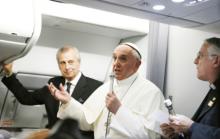
For more than three decades, the Vatican of Popes John Paul II and Benedict XVI operated on a version of the conservative maxim, “No enemies to the right.”
While left-wing theologians were silenced and liberal-to-moderate bishops were shunted aside in favor of hard-liners, liturgical traditionalists and cultural conservatives were diligently courted and given direct access to the apostolic palace.
But in a few short months, Pope Francis has upended that dynamic, alienating many on the Catholic right by refusing to play favorites and ignoring their preferred agenda items even as he stressed the kind of social justice issues that are near and dear to progressives.
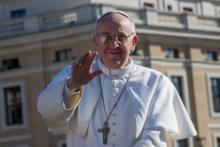
In message published on Friday, Pope Francis took the rare step of personally expressing his “esteem and friendship” to the world’s Muslims as they prepare to celebrate the end of the Ramadan fast.
While it is a long-established Vatican practice to send messages to the world’s religious leaders on their major holy days, those greetings are usually signed by the Vatican’s department for interfaith dialogue.
In his message, Francis explains that in the first year of his papacy he wanted to personally greet Muslims, “especially those who are religious leaders.”
Francis’ predecessor, Pope Benedict XVI, had fraught relations with Muslims. In a 2006 speech he quoted a Byzantine emperor who said Muhammad had only brought “evil and inhuman” things to the world, sparking a worldwide crisis in Christian-Muslim relations.

Pope Francis quickly is establishing himself as the “peoples’ Pope.” He has actively advocated for the poor, downplayed his elevated status, and speaks in colloquial terms that make him seem that much more human. He has left open the possibility that non-Catholics, non-Christians, and even atheists may fall within the vast embrace of a radically loving and merciful God. And now, he’s even made what many consider at least a benign – if not affirming – statement about homosexuality.
Historically, popes have toed an ideological line, asserting that homosexuality is inherently evil, and that all gay people are fundamentally disordered. In an expression of sincere humility, political savvy, or perhaps some combination of both, Francis took a more compassionate position, adding at the end of his comments, "who am I to judge?"
Welcome to the 20th century, Catholic Church.
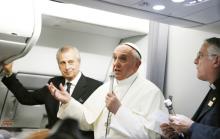
With his open and easygoing manner, Pope Francis charmed the media as much as the faithful during his successful visit to Brazil, the first international pilgrimage of his pontificate.
But it was the pope’s remarks about gay priests, made during a free-wheeling press conference on the return trip to Rome, that drew the most headlines, raising questions about whether the pontiff was signaling a change in the church’s approach to this volatile issue.
When asked by reporters about rumors of a “gay lobby” of clergy in the Vatican who were exposing the Holy See to blackmail schemes and scandal, Francis at first joked that while there’s a lot of talk about such a lobby, “I have yet to find on a Vatican identity card the word ‘gay.’”
Then, in a more serious vein, he added:
“I think that when we encounter a gay person, we must make the distinction between the fact of a person being gay and the fact of a lobby, because lobbies are not good. … If a person is gay and seeks the Lord and has good will, who am I to judge that person?”
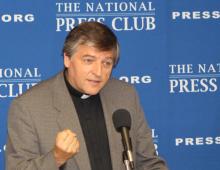
An Austrian priest who’s been banned from speaking at Roman Catholic churches during his three-week U.S. tour said Pope Francis could be an ally in reforming the Catholic Church, but said it will take more than the pope to open the priesthood to married men and women.
The Rev. Helmut Schuller, founder of the Austrian Priests’ Initiative, has been drawing crowds of several hundred people with his call for greater participation from the church’s lay “citizens” and a married priesthood.
“We are trying to open the church to a real approach to modern society,” Schuller said Monday in a speech at the National Press Club. “There are a lot of questions to our church in these times, and the answers are really old-fashioned.”
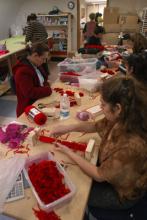
Fundraising for the flagship anti-poverty program of the U.S. Catholic bishops is slowly recovering after being battered by the recession and sharp attacks on its mission.
Officials at the Catholic Campaign for Human Development said that when 2012 collections are tallied after June 30, the program will match or slightly exceed last year’s mark of about $9.5 million. While that is still significantly down from the $12 million that the nationwide campaign was netting a few years ago, the upward trend is reassuring.
“We are pretty optimistic,” said Ralph McCloud, director of the CCHD. McCloud said he was still cautious, given the uncertain nature of the economy, but added that “if things keep going the way they have been, we could see a bit of an upswing.”

A movement of lay advocates speaking out against sexual violence is gaining steam in the faith communities. But are similar efforts happening inside church doors?
When it comes to leading denominational conversations on sexual violence, clergy across traditions express twin reactions: encouragement over the protocols already in place and the efforts of fellow advocates; and frustration with a culture of silence around sexual violence in the church. Despite strikingly different experiences across denominations — and church by church — the clergy, church staff, and seminarians who spoke with Sojourners are in agreement that addressing this issue in one’s own house is complicated at every level.
The result: a loss of potential by the American church to be a leading and vibrant institution of radical vulnerability and transformative healing.

Now that the trial for abortion provider Kermit Gosnell has ended with a conviction, many are asking what public officials in Philadelphia plan to do with the 47 bodies from the case.
After Gosnell’s arrest in 2011, then-Archbishop Cardinal Justin Rigali asked the district attorney’s office for the bodies of the aborted fetuses. The bodies were being retained for the trial, but after it ended and Gosnell was sentenced to life in prison, his successor, Archbishop Charles Chaput, has renewed the request to bury the bodies.
Francis Maier, special assistant to Chaput, said that he doesn’t know whether or not a service would include a Catholic Mass, but he said it would be quiet and dignified.
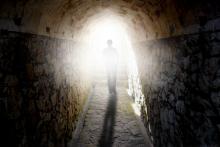
Though the church remains stuck in a culture of silence on sexual abuse, advocates are steadily building the platforms for individual voices to change the narrative. The depth of reconciliation that plays out upon these platforms can be profound. Rachel Halder, founder of Our Stories Untold — a blog that hosts stories from survivors of sexualized violence within the Mennonite church — has witnessed such moments happen in real time.
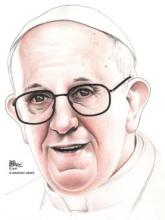
Is Pope Francis endorsing heresy?
It might look that way from the eye-catching headlines this week that made it appear everyone was bound for heaven — “even atheists!” — thanks to Jesus’ death on the cross.
The passage that prompted the reports came from Francis’ brief homily at the informal morning Mass that he celebrates in the chapel at the Vatican guesthouse.
Speaking on Wednesday, Francis said that as human beings created in the image of God, everyone has a “duty to do good.”
“The Lord has redeemed all of us, all of us, with the Blood of Christ: all of us, not just Catholics. Everyone! ‘Father, the atheists?’ Even the atheists,” he said, answering his own query. “Everyone! And this blood makes us children of God of the first class! We are created children in the likeness of God and the blood of Christ has redeemed us all!”
Cue the jaw dropping and head scratching. Atheists were pleasantly surprised, conservative Catholics were dazed and confused, and the pope’s comments raced around the Internet; for a while they were the second-most shared piece on Reddit.
So was Francis preaching a form of “universalism?" That is the unorthodox teaching that says, essentially, that all faiths are equal and all are going to heaven, especially if you are nice to people here on earth. It’s also a heresy that Francis’ predecessor, Benedict XVI, spent a career quashing every time he thought he thought he spied a hint of it in some theologian’s writings.
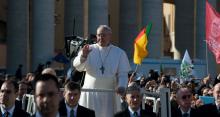
In his two months as leader of the world’s 1.2 billion Roman Catholics, Pope Francis has captured the imagination not only of his own flock, but that of the world at large.
Many of us, Catholic or not, seem to hang on his every word both for spiritual guidance and clues to the personality of the man we collectively are getting to know as perhaps the most recognizable Christian on the planet.
Two new books offer further insights into the heart and mind of the former Jorge Bergoglio through his own words. Both are fascinating reads for papal watchers and news junkies alike, painting a vivid portrait of the man, the leader, and the humble follower of Christ.
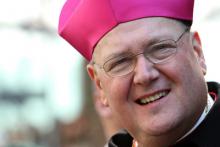
NEW YORK — When Cardinal Timothy Dolan used the morning talk shows on Easter Sunday to say the Catholic Church could do a better job of welcoming gays and lesbians, his remarks were hailed by one activist as an “Easter miracle” and by another as an encouraging “first step.”
But two months later, it’s still not clear what the second step in this fraught process might be, or even if there is a second step. And there are signs that things may only get more complicated.
Since Easter, three more states have passed same-sex marriage laws, and next month the U.S. Supreme Court will hand down a gay marriage ruling that will again spotlight the bishops’ full-throated opposition to a whole host of civil protections for gays and lesbians, particularly marriage.
Moreover, as Americans — and American Catholics — grow increasingly accepting of homosexuality, and as foes of gay rights grow increasingly determined, conflict at the parish level seems inevitable. The uneasy “Don’t Ask/Don’t Tell” policy that once allowed gay and lesbian Catholics to take church positions is clashing with their increasing visibility in the form of marriage licenses or wedding announcements.
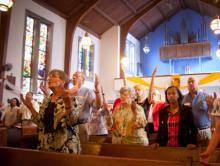
Nothing upsets the folks in the pews as much as changing the liturgy that they’re accustomed to, and that seemed likely to be the case when the Vatican ordered revisions to the familiar prayers and rubrics of the Catholic Mass.
But now, more than a year after the changes took effect in U.S. parishes, a survey of American priests shows that they are more disturbed by the innovations than their flocks.
In fact, the poll, conducted by researchers at St. John’s University School of Theology-Seminary in Collegeville, Minn., showed that almost 60 percent of priests surveyed did not like the new Roman Missal, as the liturgical book for the Mass is known, while about 40 percent approve.
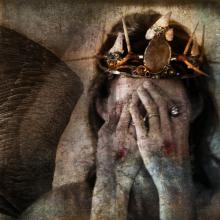
I first became aware of the realities of sexual abuse in the church at the tender age of five. I happened to look at the television screen and witnessed police officers escorting my hand-cuffed youth minister in front of a crowd of reporters screaming questions. The words “YOUTH PASTOR ABUSED CHILDREN” flashed across the television screen.
I was confused and scared. My family comforted and assured me that the pastor had only “hurt” teenage boys and that I was safe. The church hired a new minister and, on the surface, life seemed to resume to normal for our congregation. But as a child I had no idea of the effects of the abuse and its aftermath had on the survivors, their families, and our church community. Many families soon experienced disintegrating marriages, friendships were broken, and faith was lost. One survivor’s family had their home repeatedly vandalized and were forced to move hundreds of miles from our town to escape fellow believers who grew angry with them for filing a lawsuit against the perpetrator.
Church leaders shunned media attention and feared “airing dirty laundry” in public, encouraging members to keep the experience a secret for the sake of the boys and church. As a child, and then a teenager, growing up in an otherwise loving, connected church, I never remember hearing church leaders address this aspect of our shared history in the open. To some of the survivors and the broken-hearted, the silence on this topic was welcome; to others it was deafening. While secrecy was the rule, the legacy of the abuse was real and active in the community. Rather than being cared for with dignity and love, the survivors and their families felt that they were a shameful secret to be whispered about and hidden. I learned as an adult that I was intimately connected with some of the survivors but never knew about their silent pain. I had no idea that I was a participant in a culture of silence and shame that often surrounds sexual abuse and is especially pronounced when boys are abused by men in the church.
A group of priests and nuns, some of whom were assaulted as children, has quietly been gathering to publically urge the pope and American bishops to "clean house" on sexual abuse in the church.
Many members in the group, though vocal on sexual abuse cases in the past, did not know eachother until last year, when a laywoman brought them together for as a "confidential support group."
The New York Times reports:
Their aim, they say, is to support both victims and fellow whistle-blowers, and identify shortcomings in church policies. They hope to help not just minors, but also adults who fall prey to clergy who exploit their power for sex. They say that their motivation is to make the church better and safer, and to show the world that there are good priests and nuns in the church.
“We’ve dedicated our lives to the church,” the Rev. John Bambrick, a priest in the Diocese of Trenton, said at a meeting of the group last week in New York. “Having sex offenders in ministry is damaging to our ministry.”&nbsminp;
Read more here.

Who is missing from the slew of headlines this week on kidnappings, gender-based violence, and victims' paths to healing? The perpetrators themselves.
Which is why this TEDx video is a must-see.
“Gender violence issues have been seen as 'women’s issues' that some good men help out with,” Jackson Katz, PhD, Founder and Director at MVP Strategies, says in the video. “I have a problem with that frame, and I don’t accept it. It gives men an excuse to not pay attention."
The Catholic Church in Honduras is reaching out to both criminal gangs, such as Mara Salvatrucha and M18, and the government to negotiate a cessation to violence, similar to truces reached with church mediation in El Salvador, Guatemala, and Colombia. Agenzia Fides reports:
"We are in a process of recovery of the respect for life, we are listening to both gangs, but the government has not yet given an answer," said Mgr. Romulo Emiliani Sánchez, C.M.F Auxiliary Bishop of San Pedro Sula to a local radio station, announcing the start of a dialogue with the main criminal gangs in Honduras, to reach a truce similar to that in force in El Salvador.
Read more here.
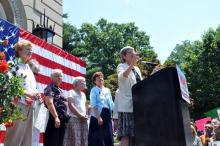
NEW YORK — The “Nuns on the Bus” are revving up their engines for another national campaign, only this time the Catholic sisters are taking their mobile platform for social justice along the country’s Southern border to push Congress to pass immigration reform.
“The ‘Nuns on the Bus’ is going on the road again!” Sister Simone Campbell, head of the social justice lobby Network, told an enthusiastic gathering of faith leaders and charity activists at a Manhattan awards ceremony Wednesday (May 1).
“This time we’re going out for commonsense immigration reform,” she said to rousing applause.
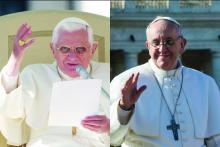
More than two months after his resignation, Pope Emeritus Benedict XVI will return to the Vatican on Thursday to live in a small convent that has been recently renovated for his needs.
Benedict’s return will face the Vatican with the unprecedented situation of a reigning pope and a retired pope living a short distance from each other.
The potential difficulty is compounded by the fact that Benedict’s personal secretary, Archbishop Georg Gaenswein, will move in with the former pope while he continues to serve as Pope Francis’ Prefect of the Papal Household, charged with setting his schedule and audiences.